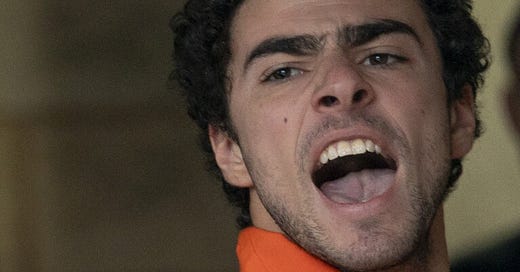Luigi Mangione
People are good.
It’s one of anti-partisanism’s bedrock beliefs and the basis for the anti-partisan issue resolution model (i.e. “Presume that people are good and are coming from a good place in their political beliefs”). If people who disagree on policy issues don’t trust that each other’s positions are well-intentioned, then finding meaningful, cooperative solutions to these issues will be impossible.
People are good. I still believe this.
But, the murder of Brian Thompson and—especially—the public reaction in some quarters is severely testing my faith on this point. Thompson, who left behind a wife and two teenage sons, was fatally shot in Midtown Manhattan just before 7 a.m. on Dec. 4, as he was walking en route to an investor’s conference.
Once upon a time, this kind of a brazen, depraved assassination of a family man would have provoked shock, horror and revulsion. The accused suspect, Luigi Mangione (we’ll get back to him shortly), would have required additional security to protect him from being subjected to mob justice at the hands of an outraged community.
I suppose this is the point where I should mention that Thompson was the chief executive of United Healthcare, the country’s largest health insurance provider. Fifty-one percent of Americans hold a somewhat or very negative opinion of the US healthcare industry, according to a Gallup poll conducted in August. Only 31% have a somewhat or very positive view of the industry.
Brian Thompson
Americans’ disgust with the healthcare business has found expression in the online reactions to Thompson’s killing. In the wake of the atrocity, a jaw-dropping, headshaking and heart-sinking number of posters on all manner of platforms and sites have responded reprehensibly, with reactions ranging from mockery to jubilation.
After United Healthcare posted a simple, touching tribute to memorialize their slain CEO on social media, comment threads were inundated with these types of sentiments. The company responded by quickly limiting public access to these threads, so social media users responded with laughing emojis. Within a day of the statement’s appearance on X, it had received almost 80,000 reaction symbols. More than 70,000 were laughing emojis.
Perhaps the most disturbing phenomenon associated with this event is the lionization/folk-heroization/sex symbolization of Thompson’s alleged killer, Mangione. Oh, you haven’t heard? Signor Luigi (whose name will always make me think of the B-list brother of Nintendo’s famous mushroom-gobbling, princess-saving plumber) is our new archetype for an anti-hero vigilante. He’s a Robin Hood for our times. He’s like Batman, only garbed in a hoodie instead of a mask and cowl. He’s a walking case of life imitating art, our own John Q. Archibald from the movie John Q, in which the titular character, played by Denzel Washington, takes a hospital waiting room full of people hostage in a desperate effort to obtain a life-saving operation for his son.
There are even mythic elements to Mangione’s story. Three shell casings found at the murder scene bore inscriptions with the words “deny,” “defend” and “depose,” allusions to tactics insurers use in the course of turning down coverage. Wannabe balladeers on Tik Tok created songs featuring the three D-words. The terms were plastered all over memes and merch—yes, Mangione-themed items have started to pop up at Etsy and other sites.
And then, of course, Mangione is becoming America’s latest #feloncrush. Photos of the suspect backpacking shirtless, dressed up in a suit and tie, and even clad in his penitentiary-issued orange jumpsuit are inescapable on social media (and in the news media) and have elicited thirsty reactions from gawkers throughout cyberspace.
But, the Luigi-loonies aren’t just content to cheer for or lust after their icon. They are also putting up “Free Luigi” signs in both physical and virtual space. They are crowdsourcing to raise money for his legal defense. They are posting poor reviews online of the McDonald’s in Altoona, PA where Mangione was caught and harassing the employee who alerted the authorities to his presence. They are even making threats against the Altoona Police Department.
Mangione has also inspired would-be copycats. This is literally true in the tackiest way possible—Luigi Mangione lookalike contests are a thing at the moment, a thing that began only days after Thompson’s death.
But, even worse, it’s also true in the traditional sense, as other corporate executives have been threatened, and “wanted” posters featuring the faces and names of CEOs have popped up around Manhattan. Executives from both healthcare-related companies and firms in other fields have been targeted.
Obviously, most of Luigi’s loonies are all talk. The reason they can be so callous in their soulless dismissals of the fact that their object of worship allegedly shot a husband and father of two dead at point blank range is because they are cloaked behind screen names and social media avatars. Make the loons own and publicize their online responses—to their families, their neighbors, their local community members and, especially, their employers—and let’s see how many of their emojis are still laughing.
However, when high-profile crimes like this occur, there is a dramatically heightened risk of actual copycat acts. Less than a week after Thompson’s assassination, Florida woman Briana Boston chillingly threatened an insurance company over the phone with Mangione’s infamous mantra, “Delay, deny, depose,” adding the ominous admonition that “you people are next.” Boston also allegedly told police that healthcare companies “deserved karma from this world because they are evil.”
Boston was charged with threats to conduct a mass shooting or an act of terrorism, a second-degree felony that could send her to prison for 15 years. Naturally, Luigi’s loons promptly started crowdsourcing to raise funds for her defense too.
The loons defend the inhumanity of their position by citing the inhumanity they say is standard operating procedure in the way health insurers do business. And their criticisms of the industry are not entirely without substance.
Even at this moment, I can personally attest to the fact that insurance companies suck. Last month, I sustained a leg injury, which may involve a torn muscle. However, before I can get an MRI covered, I will most likely have to complete a full 10 weeks of physical therapy. So, it will be three or more months since I suffered the injury until I can even find out what it is.
Yeah, health insurance companies are the worst.
But, that doesn’t give me justification to kill a healthcare executive. Nor does it rationalize my celebrating the death of one online.
Now, obviously, there are far worse insurer-related horror stories than those involving a hurt leg. An untold number of denial-of-coverage decisions have resulted in seriously adverse or even fatal health outcomes.
But, that’s a healthcare reform issue, a policy item. It’s a completely separate problem from the one the loonies are revealing: widespread societal desensitization toward wanton acts of violence and the loss of innocent life.
Because if your reaction to the cold-blooded execution of a husband and father on his way to work in the morning is to exult or smirk or snark or say yes, the killing was terrible, but…, then that is on you. Don’t dishonor the memory of whomever you lost or appropriate the experience of the loved one or friend you know who suffered or even cheapen your own experience by trying to make it about anything else other than your own conscious devaluation of human life.
If healthcare firms devalue human life, then that’s on them, and it’s on us to fix it. But, when you do it, it’s on you.
Portions of this post have been adapted from my book The Anti-Partisan Manifesto: How Parties and Partisanism Divide America and How to Shut Them Down. Buy the book here. For the time being, it is only available digitally. To read, download the Kindle app to your phone, your iPad or tablet, your Kindle device or your computer.
Follow me on X at @JeffGebeau or on Facebook





